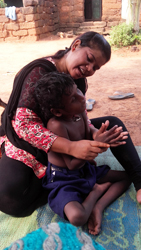The Deaf Blind project of aaina in support of Sense International recognizes deaf blind as a separate category needing provision accordingly. Children with particular disability in society have been refrained from participation in social, educational and economic systems. Presence of both Blindness and Deafness can leave the children in extreme isolation further limiting their participation amd growth. The project aims to promote inclusion of deaf blind children and children with multiple disabilities through extending support in education mainstreaming by collaborating with SSA-OPEPA and also through explicit programmed planning for the children. Bringing the families of the deaf blind people together is another strategy to see the rightful place of these people in society and facilitate advocacy by the deaf blind people and their families.
Despite invisibility of deaf-blind children due to their confinement in closed boundary of premises, staff of aaina has identified 16 deaf-blind children in the districts of Khorda and Ganjam. Most of the children belong to poor and below poverty line families. Through home visits, the staff is currently involved in providing training to family members of the children to improve upon grooming of children, mobility if the child has multiple disability and communication with these children. It is vital to improve upon their communication for them to be mainstreamed in society and sign language is being taught to the children and their family members for the reason. Efforts are being made to bring change in the mindset from deaf blind children being "totally dependent" to being functional and capable to participate in daily routine activities if correct initiatives taken by the family members. At educational front also, efforts are being made to convince teachers about the abilities of these children and accept them in schools. General information of these children has been collected from their parents, family member and neighbors. General assessment of all the children has been completed. Functional assessment of 4 children has been done and Individualistic Education Plan of 2 children has been completed so far. Home based activities with the children will continue and the skills will be transferred to improve upon their independence
Deaf-blind children get home based trainings to improve their functional capabilities and independence


